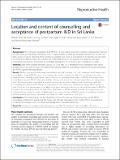| dc.contributor.author | Karra, Mahesh | en_US |
| dc.contributor.author | Canning, David | en_US |
| dc.contributor.author | Foster, Sorcha | en_US |
| dc.contributor.author | Shah, Iqbal H. | en_US |
| dc.contributor.author | Senanayake, Hemantha | en_US |
| dc.contributor.author | Ratnasiri, U. D. P. | en_US |
| dc.contributor.author | Pathiraja, Ramya Priyanwada | en_US |
| dc.date.accessioned | 2017-04-06T03:19:59Z | |
| dc.date.issued | 2017 | en_US |
| dc.identifier.citation | Karra, Mahesh, David Canning, Sorcha Foster, Iqbal H. Shah, Hemantha Senanayake, U. D. P. Ratnasiri, and Ramya Priyanwada Pathiraja. 2017. “Location and content of counselling and acceptance of postpartum IUD in Sri Lanka.” Reproductive Health 14 (1): 42. doi:10.1186/s12978-017-0304-7. http://dx.doi.org/10.1186/s12978-017-0304-7. | en |
| dc.identifier.issn | | en |
| dc.identifier.uri | http://nrs.harvard.edu/urn-3:HUL.InstRepos:32072129 | |
| dc.description.abstract | Background: The immediate postpartum IUD (PPIUD) is a long-acting, reversible method of contraception that can be used safely and effectively following a birth. To appropriately facilitate the immediate postpartum insertion of IUDs, women must be informed of the method’s availability and must be counselled on its benefits and risks prior to entering the delivery room. We examine the relationship between the location and quality of antenatal counselling and women’s acceptance of immediate postpartum IUD (PPIUD) in four hospitals in Sri Lanka. Methods: Data were collected between January 2015 and May 2015. Modified Poisson regressions with robust standard errors are used to assess the relationships between place of counselling, indicators of counselling quality, and PPIUD uptake following delivery. Results: We find that women who were counselled in hospital antenatal clinics and admission wards were much more likely to have a PPIUD inserted than women who were counselled in field clinics or during home visits. Hospital-based counselling had higher quality indicators for providing information on PPIUD, and women were more likely to receive PPIUD information leaflets in hospital locations than in lower-tiered clinics or during home visits. Women who were counselled at hospital locations also reported a higher level of satisfaction with the counselling that they received. Receipt of hospital-based counselling was also linked to higher PPIUD uptake, in spite of the fact that women were more likely to be given information about the risks and alternatives to PPIUD in hospitals. The information about the risks of and alternatives to PPIUD, whether provided in hospital or in non-hospital settings, tended to lower the likelihood of acceptance to have a PPIUD insertion. Counselling in hospital admission wards was focused on women who had not been counselled at field clinics. Conclusions: The study findings call for efforts that improve the training of midwives who provide PPIUD counselling at field clinics and during the home visits. We also recommend that routine PPIUD counselling be conducted in hospitals, even if women have already been counselled elsewhere. | en |
| dc.language.iso | en_US | en |
| dc.publisher | BioMed Central | en |
| dc.relation.isversionof | doi:10.1186/s12978-017-0304-7 | en |
| dc.relation.hasversion | http://www.ncbi.nlm.nih.gov/pmc/articles/PMC5351270/pdf/ | en |
| dash.license | LAA | en_US |
| dc.subject | Postpartum family planning | en |
| dc.subject | Postpartum IUD (PPIUD) | en |
| dc.subject | Quality of care | en |
| dc.subject | Counselling | en |
| dc.subject | SRI Lanka | en |
| dc.title | Location and content of counselling and acceptance of postpartum IUD in Sri Lanka | en |
| dc.type | Journal Article | en_US |
| dc.description.version | Version of Record | en |
| dc.relation.journal | Reproductive Health | en |
| dash.depositing.author | Karra, Mahesh | en_US |
| dc.date.available | 2017-04-06T03:19:59Z | |
| dc.identifier.doi | 10.1186/s12978-017-0304-7 | * |
| dash.contributor.affiliated | Shah, Iqbal | |
| dash.contributor.affiliated | Karra, Mahesh | |
| dash.contributor.affiliated | Canning, David | |
| dc.identifier.orcid | 0000-0003-4041-1229 | |


